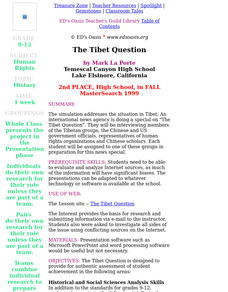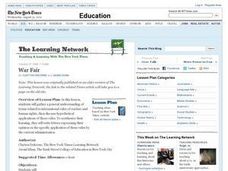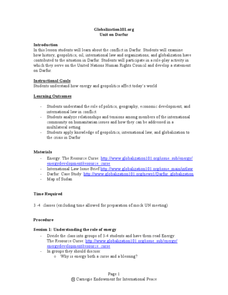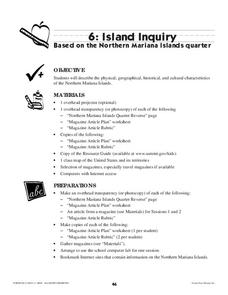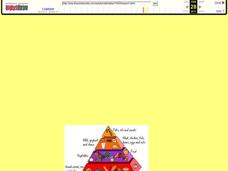Curated OER
The Tibet Question
Students participate in a simulation, where they interview members of the Tibetan groups, the Chinese and US government officials, representatives of human rights organizations and Chinese scholars. Each student will be assigned to one...
Curated OER
War Fair
Students gather a general understanding of terms related to international rules of warfare and human rights, then discuss hypothetical applications of those rules. They write letters expressing their opinion on the current application of...
Curated OER
Globalization: Darfur
High schoolers examine the conflict in Darfur. In this global studies lesson, students listen to their instructor present a lecture about how history, geopolitics, and international law have contributed to the conflict....
Curated OER
A Child: Past And Present, Rich And Poor
Ninth graders analyze universal human rights. They examine their causes, consequences, and possible solutions, and discuss selected global issues. They plan and evaluate age appropriate actions to support peace and sustainability in our...
National Wildlife Federation
Fish and Ladders: Grades 5-8
Swim with the fishes. Learners simulate the migration of Chinook salmon. Groups pretend to be salmon, while others are predators, fishers, and hazards. The salmon start in the spawning area and swim downstream to the ocean until reaching...
EngageNY
Grade 9 ELA Module 3, Unit 1, Lesson 4
Can dogs feel shame? Explore the anthropomorphic connection between human emotions and animal behavior—or lack thereof—with a lesson about Temple Grandin's book, Animals in Translation. Ninth graders continue a close reading of chapter...
Curated OER
Island Inquiry: Based on the Northern Mariana Islands Quarter
Students research two physical and/or human characteristic topics of the Northern Mariana Islands in groups of four students. In this social studies lesson, students analyze how to write magazine articles and research the two topics...
Curated OER
Food Pyramid
Students identify good nutrition. In this food pyramid lesson, students learn the basics of good nutrition, identify the six basic food groups, state the effects of the food on the human body, and learn nutritional information while...
Curated OER
The First Amendment
Students examine the freedoms and rights guaranteed by the First Amendment. In this Bill of Rights lesson plan, students review court cases and create a collage that require them to consider the right they are guaranteed by the First...
Curated OER
In Search of Rights
Seventh graders research Supreme Court cases. They formally debate court rulings, write a scenario portraying a possible futuristic America and participate in a field practicum for media production, while evaluating various social,...
Curated OER
Our National Documents
Students explore the significance of National Documents. In this National Documents lesson, students read handouts regarding the Declaration of Independence, the U.S. Constitution, and Bill of Rights. Students complete the provided...
Curated OER
The Basics of Creature Connectedness: Biodiversity Diversions
Students study biodiversity. They participate in a scavenger hunt to look for presence of wildlife and connections in nature. They create a collage about Venezuelan biodiversity in small groups and present to the class. They write a...
Curated OER
How Resourceful Are You?
Students investigate the concept of resources. They differentiate between natural, human, and capital resources. Prior to the lesson the students need to build background knowledge of goods, services, needs, and wants. They create a...
Curated OER
Why do we need a Government
Students explore some of the ideas of major importance to the Founders, why we need a government, and how the Founders believed governments should be created and what they should do. They think of a right that all people should have and...
Curated OER
Women's History Week
Students investigate the contributions of women who influenced human rights in US history. They examine the influence Susan B. Anthony, Harriet Tubman, Sojourner Truth and Elizabeth Cady Stanton by participating in a jigsaw activity....
Curated OER
Special Protections-Session Six
Parents and children work together in a community circle to discuss caring for people with special needs. In separate groups, the children sing and listen to a story. They discuss ways people are alike, and ways they are different....
Curated OER
Bringing Peace to the Balkans, Piece by Piece
Students examine how the bond of traditions became the binding force of nationalism for which the Serbian forces now fight at the cost of the lives and livelihoods of ethnic Albanians. explore human rights issues surrounding the conflict...
Curated OER
You and the Law -- Beating the Odds
Middle schoolers examine the rate of institutional racism in the United States. Individually, they write in their journals about how they can make better choices and increase their self-esteem. Using historical documents, they identify...
Curated OER
The Noble Savage - The Social Contract Rights and Freedoms of Modern Humanity
Students, in groups, research various philosophers and the historical context of their work. They discuss the necessity and interaction of laws, regulations and human freedoms and consider the importance of the Canadian government to its...
Curated OER
A Time for Justice
Young scholars explain the protections and privileges of individuals and groups in the United States.
Curated OER
What does it mean to be a citizen?
Young scholars examine democracy and the role of a citizen. They contrast rights and responsibilities of individuals, groups, and organizations. Students identify two forms of democratic action and describe demoncratic values. Young...
Curated OER
Human Trafficking & Modern Day Slavery - Debating the Fundamentals
Students research the trafficking and slavery issues in a country of their choice. In groups, they prepare arguments which support their point of view. They reverse their positions to make the debate more interesting.
Tennessee State Museum
Deciphering the Document: Unlocking the Meaning of the Emancipation Proclamation
Help your learners truly understand the Emancipation Proclamation by asking them the put it into their own words. After reading the document out loud to the class, and briefly discussing the legal language, split your class into small...
Curated OER
What Are the Most Recent Developments in Animal and Human Cloning?
Students research the developments of animal and human cloning. They report their findings to the class. They write journal entries as well.


